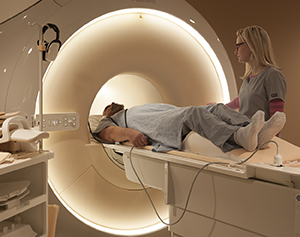A
B
C
D
E
F
G
H
I
J
K
L
M
N
O
P
Q
R
S
T
U
V
W
X
Y
Z
Click a letter to see a list of conditions beginning with that letter.
Click 'Topic Index' to return to the index for the current topic.
Click 'Library Index' to return to the listing of all topics.
Magnetic Resonance Imaging (MRI)
Magnetic resonance imaging (MRI) is a type of test. It lets your healthcare provider see pictures of the inside of your body. MRI uses strong magnets, radio waves, and a computer to make an image. Because it uses strong magnets, you need to tell the healthcare team about any metal in or on your body.
How do I get ready for an MRI?
-
Follow any instructions for not eating or drinking before the test.
-
Ask if you should stop taking any medicine before the test.
-
Don’t wear makeup. Some makeup contains metal.
-
You will be asked if you have any metal in or on your body. This includes electronic devices or implants. It includes metal plates, screws, clips, pins, or wires. Tell them if you may have any other metal pieces in your body, such as metal shavings or metal left from an injury.
-
Remove your watch, jewelry, and hearing aids. Take all objects out of your pockets. This includes credit cards, pens, pocketknife, glasses, and other objects that may have metal.
What happens during an MRI?
 |
| You will be asked to hold very still during the scan. |
Most MRI tests take 30 minutes to 1 hour. But the test may take longer. This depends on the type of MRI you have. During this time:
-
You may be asked to wear a hospital gown.
-
You may be given earplugs to wear. This is because the MRI machine can be loud.
-
You may be injected with a special dye called contrast. This makes the MRI image better.
-
You’ll lie down on a platform. The platform then slides into the MRI machine.
-
You’ll need to lie still as directed. Follow all instructions from the healthcare team during the scan.
-
The platform slides out of the MRI machine when the test is done.
What to tell your healthcare provider
Tell the healthcare team if you:
-
Have had an imaging test such as MRI or CT with contrast dye
-
Ever had a reaction to contrast dye
-
Are allergic to iodine or shellfish
-
Are allergic to any medicines
-
Have diabetes or kidney disease
-
Had a liver transplant
-
Have any other serious health condition
-
Are or may be pregnant
-
Are breastfeeding
What happens after an MRI?
-
You can go back to normal activities right away.
-
Contrast dye will pass naturally through your body within 1 day. You may be told to drink more water or other fluids during this time.
-
Your healthcare provider will discuss the test results with you. This may be done during a follow-up visit or over the phone.
-
Your next appointment is: __________________
Online Medical Reviewer:
Marianne Fraser MSN RN
Online Medical Reviewer:
Stacey Wojcik MBA BSN RN
Date Last Reviewed:
9/1/2025
© 2000-2026 The StayWell Company, LLC. All rights reserved. This information is not intended as a substitute for professional medical care. Always follow your healthcare professional's instructions.